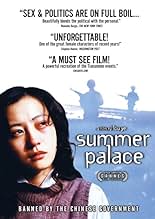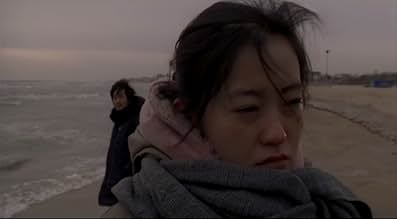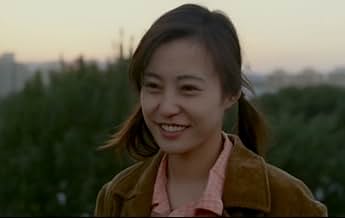IMDb RATING
7.2/10
4.5K
YOUR RATING
Yu Hong leaves her home village and starts university in Beijing, where she develops a consuming and compulsive relationship with another student. The student riots from 1989 then ensue and ... Read allYu Hong leaves her home village and starts university in Beijing, where she develops a consuming and compulsive relationship with another student. The student riots from 1989 then ensue and take a toll on their lives.Yu Hong leaves her home village and starts university in Beijing, where she develops a consuming and compulsive relationship with another student. The student riots from 1989 then ensue and take a toll on their lives.
- Awards
- 1 nomination
- Director
- Writers
- All cast & crew
- Production, box office & more at IMDbPro
Storyline
Did you know
- TriviaIn September of 2006, director Lou Ye was barred from making movies for five years because the film incorporated footage of the Tiananmen Square demonstrations and wasn't screened for Chinese officials. The Chinese government also demanded that all copies of the film be confiscated.
- GoofsThere were no nightclubs or bars in 1980's Beijing such as the ones portrayed in Summer Palace. Despite the presence of a few underground bars in Beijing at that time, it is highly improbably that any university students would patron such establishments. Moreover, those bars did not play American pop music, did not allow dancing, did not stock western liquor, and certainly did not admit foreigners. Any clubs or bars like the ones shown in Summer Palace did not begin appearing in Beijing until the late 1990s and did not gain popularity amongst middle-class college students until after the new millennium.
- ConnectionsFeatures The 400 Blows (1959)
- SoundtracksIn Yeon
Performed by Ha Dong-jin
Featured review
Lou Ye's "Summer Palace" ("Yihe yuan") has plenty of frontal nudity and a fair number of (not very attractive) sex scenes, but that's not why the movie was banned by Beijing, and Ye forbidden to work in the film industry for five years.
More likely, official displeasure was incurred by the film's powerful recreation of the Tiananmen events of 1989, from the students' point of view - and, coincidentally, equaling Tolstoy's representation of the chaos of war in the Borodino scenes of "War and Peace." And yet, all that is besides the point.
Rather, after tonight's screening of "Summer Palace" in the Castro, at the 25th annual San Francisco International Asian American Film Festival, your bewildered and overwhelmed reporter is positing this central question: whither Lou Ye? After those five years (or making movies elsewhere) will Ye become the new Zhang Yimou and China's best or just an imitator of the loathsome Tsai Ming-liang, teasing and torturing the audience... just because he can?
My money - and hope - is on the better scenario. However strange and convoluted and bizarre and frustrating "Summer Palace" may be, it appears "sincere" and not reaching for effect. It's a magnificent failure or a miserable masterpiece, a stupid soap opera or a splendid insight into the human condition - the choice is up to you; for me, it was all that, and more. Seen so far only at film festivals (Cannes, Toronto, Mill Valley, Pusan and Oslo), the film is due for release in France next month and not, so far, in the U.S.
Lack of commercial exposure may not be a bad thing. This is a "festival film," if there was ever one, and watching it on DVD may be the next best thing. If it came to theaters in this country, few people would go to see it, and of those, many would leave long before its conclusion 2 hours and 20 minutes later. And yet, and yet...
The script - also by Ye, apparently heavily autobiographical - follows a group of young people from their Beijing University days in the 1980s through the present. The central character is Yu Hong, a teenager from the countryside. As played by Lei Hao - with little of Zhang Ziyi's physical charms and a hundred times her acting ability - here is a cinematic heroine for the ages: a complex, puzzling, neurotic young woman with touching aspirations and scary unpredictability. Lei Hao becomes the character in a naked, unselfconscious, totally believable way - she alone make "Summer Palace" a must-see film (except that you can't).
Ye's way of telling the story is personal, iconoclastic, dragging here, speeding up there, taking us to Berlin (?!), unintentionally nonlinear, showing Yu Hong is similar situations time and again - and yet slowly spinning an intelligent, poetic subtext in the background.
Hard as it may be to imagine, "Summer Palace" has something in common with Alain Resnais' "Last Year in Marienbad," in its wistfulness, lack of specific believability and yet presenting a feeling that makes perfect "sense." There are a hundred things "wrong" with Ye's work and yet it's one of the more memorable films in years.
More likely, official displeasure was incurred by the film's powerful recreation of the Tiananmen events of 1989, from the students' point of view - and, coincidentally, equaling Tolstoy's representation of the chaos of war in the Borodino scenes of "War and Peace." And yet, all that is besides the point.
Rather, after tonight's screening of "Summer Palace" in the Castro, at the 25th annual San Francisco International Asian American Film Festival, your bewildered and overwhelmed reporter is positing this central question: whither Lou Ye? After those five years (or making movies elsewhere) will Ye become the new Zhang Yimou and China's best or just an imitator of the loathsome Tsai Ming-liang, teasing and torturing the audience... just because he can?
My money - and hope - is on the better scenario. However strange and convoluted and bizarre and frustrating "Summer Palace" may be, it appears "sincere" and not reaching for effect. It's a magnificent failure or a miserable masterpiece, a stupid soap opera or a splendid insight into the human condition - the choice is up to you; for me, it was all that, and more. Seen so far only at film festivals (Cannes, Toronto, Mill Valley, Pusan and Oslo), the film is due for release in France next month and not, so far, in the U.S.
Lack of commercial exposure may not be a bad thing. This is a "festival film," if there was ever one, and watching it on DVD may be the next best thing. If it came to theaters in this country, few people would go to see it, and of those, many would leave long before its conclusion 2 hours and 20 minutes later. And yet, and yet...
The script - also by Ye, apparently heavily autobiographical - follows a group of young people from their Beijing University days in the 1980s through the present. The central character is Yu Hong, a teenager from the countryside. As played by Lei Hao - with little of Zhang Ziyi's physical charms and a hundred times her acting ability - here is a cinematic heroine for the ages: a complex, puzzling, neurotic young woman with touching aspirations and scary unpredictability. Lei Hao becomes the character in a naked, unselfconscious, totally believable way - she alone make "Summer Palace" a must-see film (except that you can't).
Ye's way of telling the story is personal, iconoclastic, dragging here, speeding up there, taking us to Berlin (?!), unintentionally nonlinear, showing Yu Hong is similar situations time and again - and yet slowly spinning an intelligent, poetic subtext in the background.
Hard as it may be to imagine, "Summer Palace" has something in common with Alain Resnais' "Last Year in Marienbad," in its wistfulness, lack of specific believability and yet presenting a feeling that makes perfect "sense." There are a hundred things "wrong" with Ye's work and yet it's one of the more memorable films in years.
- How long is Summer Palace?Powered by Alexa
Details
- Release date
- Countries of origin
- Official sites
- Languages
- Also known as
- 頤和園
- Filming locations
- Production companies
- See more company credits at IMDbPro
Box office
- Budget
- $2,500,000 (estimated)
- Gross US & Canada
- $63,045
- Opening weekend US & Canada
- $8,717
- Jan 20, 2008
- Gross worldwide
- $143,027
- Runtime2 hours 38 minutes
- Color
- Aspect ratio
- 1.85 : 1
Contribute to this page
Suggest an edit or add missing content



























